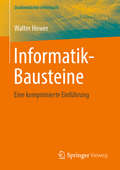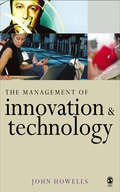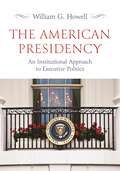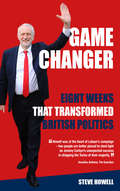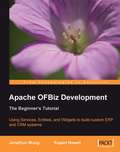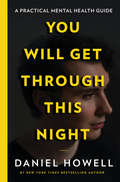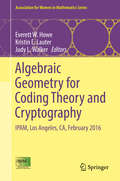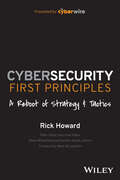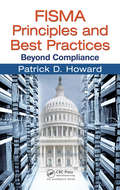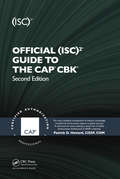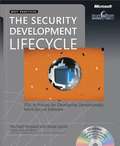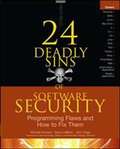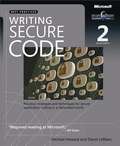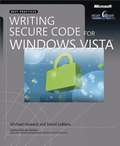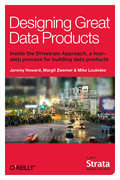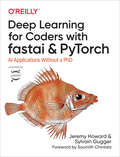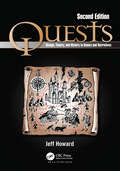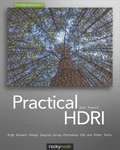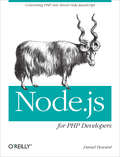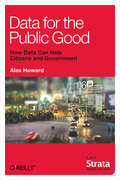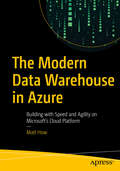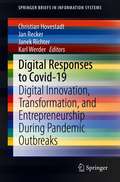- Table View
- List View
Informatik-Bausteine: Eine komprimierte Einführung (Studienbücher Informatik)
by Walter HowerDieses Lehrbuch präsentiert prüfungsrelevantes Basismaterial für Bachelor-Studierende informatiknaher Studiengänge an Hochschulen und Universitäten. Es kombiniert die Themen Diskrete Mathematik, Theoretische Informatik, Algorithmik und Künstliche Intelligenz in einem Band. Die prägnante Form zielt auf eine effiziente Vorbereitung der jeweiligen Prüfung ab; hierzu hilft auch das wohlsortierte Sachwort-Verzeichnis am Ende dieses handlichen Werkes.
The Management of Innovation and Technology: The Shaping of Technology and Institutions of the Market Economy
by Dr John Howells`The book provides a valuable resource for researchers, practitioners and policy-makers... In particular, it provides a good introduction to broader aspects of the field of innovation for researchers based within the engineering and science traditions' - Journal of Manufacturing Technology Management `Howells has synthesised a broad range of sources with considerable insight to provide the first sophisticated single volume on innovation that draws on economics, sociology, law and from the history of science and technology. By setting innovation in social and institutional context, he convincingly shows how firms and markets shape and can be shaped by the decisions of managers and entrepreneurs. I will certainly be using this book as a central text for my Masters degree teaching on innovation management, management of technology and related topics' - Jonathan Liebenau, London School of Economics and Columbia University `A great strength of the book is the extensive and detailed integration of rich case study analyses into the main flow of the argument. Many apparently well known cases are revisited and critically assessed to draw clear and often contrary to popular belief lessons. This is a highly original and commendable feature of this text. It provides an unusually strong integration between theory and examples. And there is no doubt of the relevance of the examples: they are not inserted as an afterthought, but are intrinsically part of the development of the thinking' - Professor James Fleck, Head of Entrepreneurship and Innovation Group, University of Edinburgh Management School This book analyses a range of social contexts in which human decisions shape technology in the market economy. It comprises a critical review of both a select research literature and in-depth historical studies. Material is drawn from many social science disciplines to inform the reader of the reality of taking decisions on innovation. The chapters cover: - The social context for individual acts of creative insight - The development of the technology-market relationship - The management of R&D and technological standards - Technological competition - The role of institutions of finance in innovation - The reciprocal relationship between intellectual property law and technological innovation. - The role of technological skills and regimes of technological education in innovation. - An introduction to the role of the state in maintaining the innovative capacity of the private sector.
The American Presidency: An Institutional Approach to Executive Politics
by William G. HowellHow institutions shape the American presidencyThis incisive undergraduate textbook emphasizes the institutional sources of presidential power and executive governance, enabling students to think more clearly and systematically about the American presidency at a time when media coverage of the White House is awash in anecdotes and personalities. William Howell offers unparalleled perspective on the world’s most powerful office, from its original design in the Constitution to its historical growth over time; its elections and transitions to governance; its interactions with Congress, the courts, and the federal bureaucracy; and its persistent efforts to shape public policy. Comprehensive in scope and rooted in the latest scholarship, The American Presidency is the perfect guide for studying the presidency at a time of acute partisan polarization and popular anxiety about the health and well-being of the republic.Focuses on the institutional structures that presidents must navigate, the incentives and opportunities that drive them, and the constraints they routinely confrontShows how legislators, judges, bureaucrats, the media, and the broader public shape the contours and limits of presidential powerEncourages students to view the institutional presidency as not just an object of study but a way of thinking about executive politicsHighlights the lasting effects of important historical moments on the institutional presidencyEnables students to grapple with enduring themes of power, rules, norms, and organization that undergird democracy
GAME CHANGER Eight Weeks That Transformed British Politics: Inside Corbyn's Election Machine
by Steve Howell'If you want to get the inside account of Labour's historic general election campaign, I couldn't recommend more former Corbyn staffer Steve Howell's Game Changer.' Owen Jones'Game Changer is a vivid account of what it was like to be in the engine room of Jeremy Corbyn's remarkable election campaign.' Dennis Kavanagh, Emeritus Professor of Politics, University of LiverpoolWhen Theresa May called a snap election in 2017, Labour was more than twenty points behind in the polls and it seemed the only question was how big her landslide would be. In the most dramatic election of modern times, Corbyn's inspirational campaign transformed British politics. Labour won its best vote for twenty years and the largest increase in its vote share since 1945. Far from winning a landslide, the Tories were left without a majority and forced to abandon many of their unpopular plans.Steve Howell was at the centre of Corbyn's election machine. A member of the Labour leader's strategy group, he was involved in all the key campaign decisions. From the outset, he believed that Corbyn's campaigning skills, enthusiastic army of supporters and hopeful message could produce a surge in support. In Game Changer, he tells the story of eight weeks that transformed British politics.
GAME CHANGER Eight Weeks That Transformed British Politics: Inside Corbyn’s Election Machine
by Steve Howell'If you want to get the inside account of Labour's historic general election campaign, I couldn't recommend more former Corbyn staffer Steve Howell's Game Changer.' Owen Jones'Game Changer is a vivid account of what it was like to be in the engine room of Jeremy Corbyn's remarkable election campaign.' Dennis Kavanagh, Emeritus Professor of Politics, University of Liverpool When Theresa May called a snap election in 2017, Labour was more than twenty points behind in the polls and it seemed the only question was how big her landslide would be. In the most dramatic election of modern times, Corbyn's inspirational campaign transformed British politics. Labour won its best vote for twenty years and the largest increase in its vote share since 1945. Far from winning a landslide, the Tories were left without a majority and forced to abandon many of their unpopular plans.Steve Howell was at the centre of Corbyn's election machine. A member of the Labour leader's strategy group, he was involved in all the key campaign decisions. From the outset, he believed that Corbyn's campaigning skills, enthusiastic army of supporters and hopeful message could produce a surge in support. In Game Changer, he tells the story of eight weeks that transformed British politics.
Apache OFBiz Development: The Beginner's Tutorial
by Rupert Howell Jonathon WongThis is an accessible step-by-step tutorial that introduces readers to the world of OFBiz through practical examples and clear explanations. It will guide you through the framework, teach you to tweak OFBiz and master widgets, entities, and permissions, and give you the knowledge to customize your own bespoke applications. This book is for developers who want to build easily deployed and supported OFBiz applications. No previous knowledge of OFBiz is assumed, but readers should be comfortable in a Java development environment.
You Will Get Through This Night
by Daniel HowellA practical guide to taking control of your mental health for today, tomorrow, and the days after, from the #1 New York Times bestselling author and beloved entertainer. ‘There’s a moment at the end of every day, where the world falls away and you are left alone with your thoughts. A reckoning, when the things you have been pushing to the background, come forward and demand your attention.’ Written by Daniel Howell, in consultation with a qualified psychologist, in an entertaining and personal way from the perspective of someone who has been through it all—this no-nonsense book gives you the tools to understand your mind so you can be in control and really live. Split into three chapters for each stage of the journey: This Night - how to get through your toughest moments and be prepared to face anything. Tomorrow - small steps to change your thoughts and actions with a big impact on your life. The Days After - help to look after yourself in the long term and not just survive, but thrive. You will laugh and learn—but most of all, this book will assure you that even in your darkest times, there is always hope. You will get through this night.
Algebraic Geometry for Coding Theory and Cryptography: IPAM, Los Angeles, CA, February 2016 (Association for Women in Mathematics Series #9)
by Everett W. Howe Kristin E. Lauter Judy L. WalkerCovering topics in algebraic geometry, coding theory, and cryptography, this volume presents interdisciplinary group research completed for the February 2016 conference at the Institute for Pure and Applied Mathematics (IPAM) in cooperation with the Association for Women in Mathematics (AWM). The conference gathered research communities across disciplines to share ideas and problems in their fields and formed small research groups made up of graduate students, postdoctoral researchers, junior faculty, and group leaders who designed and led the projects. Peer reviewed and revised, each of this volume's five papers achieves the conference's goal of using algebraic geometry to address a problem in either coding theory or cryptography. Proposed variants of the McEliece cryptosystem based on different constructions of codes, constructions of locally recoverable codes from algebraic curves and surfaces, and algebraic approaches to the multicast network coding problem are only some of the topics covered in this volume. Researchers and graduate-level students interested in the interactions between algebraic geometry and both coding theory and cryptography will find this volume valuable.
Cybersecurity First Principles: A Reboot of Strategy and Tactics
by Rick HowardThe first expert discussion of the foundations of cybersecurity In Cybersecurity First Principles, Rick Howard, the Chief Security Officer, Chief Analyst, and Senior fellow at The Cyberwire, challenges the conventional wisdom of current cybersecurity best practices, strategy, and tactics and makes the case that the profession needs to get back to first principles. The author convincingly lays out the arguments for the absolute cybersecurity first principle and then discusses the strategies and tactics required to achieve it. In the book, you'll explore: Infosec history from the 1960s until the early 2020s and why it has largely failed What the infosec community should be trying to achieve instead The arguments for the absolute and atomic cybersecurity first principle The strategies and tactics to adopt that will have the greatest impact in pursuing the ultimate first principle Case studies through a first principle lens of the 2015 OPM hack, the 2016 DNC Hack, the 2019 Colonial Pipeline hack, and the Netflix Chaos Monkey resilience program A top to bottom explanation of how to calculate cyber risk for two different kinds of companies This book is perfect for cybersecurity professionals at all levels: business executives and senior security professionals, mid-level practitioner veterans, newbies coming out of school as well as career-changers seeking better career opportunities, teachers, and students.
FISMA Principles and Best Practices: Beyond Compliance
by Patrick D. HowardWhile many agencies struggle to comply with Federal Information Security Management Act (FISMA) regulations, those that have embraced its requirements have found that their comprehensive and flexible nature provides a sound security risk management framework for the implementation of essential system security controls. Detailing a proven appro
Official ((isc)2 Press Ser.)
by Patrick D. HowardSignificant developments since the publication of its bestselling predecessor, Building and Implementing a Security Certification and Accreditation Program, warrant an updated text as well as an updated title. Reflecting recent updates to the Certified Authorization Professional (CAP) Common Body of Knowledge (CBK) and NIST SP 800-37, the Official
The Security Development Lifecycle: A Process for Developing Demonstrably More Secure Software
by Michael Howard Steve Lipner<div xmlns="http://www.w3.org/1999/xhtml"><p>With expert insights, this introduction to the Security Development Lifecycle (SDL) provides you with a history of the methodology and guides you through each stage of the proven process\u2014from design to release\u2014that helps minimize security defects.</p></div>
24 Deadly Sins Of Software Security: Programming Flaws And How To Fix Them
by Michael Howard David LeBlanc John ViegaFully updated to cover the latest security issues, 24 Deadly Sins of Software Security reveals the most common design and coding errors and explains how to fix each one-or better yet, avoid them from the start. Michael Howard and David LeBlanc, who teach Microsoft employees and the world how to secure code, have partnered again with John Viega, who uncovered the original 19 deadly programming sins. They have completely revised the book to address the most recent vulnerabilities and have added five brand-new sins. This practical guide covers all platforms, languages, and types of applications. Eliminate these security flaws from your code:
Writing Secure Code
by Michael Howard David LeblancKeep black-hat hackers at bay with the tips and techniques in this entertaining, eye-opening book! Developers will learn how to padlock their applications throughout the entire development process--from designing secure applications to writing robust code that can withstand repeated attacks to testing applications for security flaws. Easily digested chapters reveal proven principles, strategies, and coding techniques. The authors--two battle-scarred veterans who have solved some of the industry's toughest security problems--provide sample code in several languages. This edition includes updated information about threat modeling, designing a security process, international issues, file-system issues, adding privacy to applications, and performing security code reviews. It also includes enhanced coverage of buffer overruns, Microsoft® .NET security, and Microsoft ActiveX® development, plus practical checklists for developers, testers, and program managers.
Writing Secure Code for Windows Vista®
by Michael Howard David LeblancGet the definitive guide to writing more-secure code for Windows Vista--from the authors of the award-winning Writing Secure Code, Michael Howard and David LeBlanc. This reference is ideal for developers who understand the fundamentals of Windows programming and APIs. It complements Writing Secure Code, examining the delta between Windows XP and Windows Vista security. You get first-hand insights into design decisions, lessons learned from Windows Vista development, and practical advice for solving real-world security issues. Discover how to: Develop applications to run without administrator privileges Apply best practices for using integrity controls Help protect your applications with ASLR, NX, and SafeSEH Evaluate authentication, authorization, and cryptography enhancements in Windows Vista Write services that restrict privileges and tokens--and sidestep common problems Learn how Windows Internet Explorer 7 defenses and new security features affect your development efforts PLUS--Get Microsoft Visual C#, Visual C++, and C code samples on the Web
Designing Great Data Products
by Jeremy Howard Margit Zwemer Mike LoukidesIn the past few years, we’ve seen many data products based on predictive modeling. These products range from weather forecasting to recommendation engines like Amazon's. Prediction technology can be interesting and mathematically elegant, but we need to take the next step: going from recommendations to products that can produce optimal strategies for meeting concrete business objectives.We already know how to build these products: they've been in use for the past decade or so, but they're not as common as they should be. This report shows how to take the next step: to go from simple predictions and recommendations to a new generation of data products with the potential to revolutionize entire industries.
Deep Learning for Coders with fastai and PyTorch: Ai Applications Without A Phd
by Jeremy Howard Sylvain GuggerDeep learning is often viewed as the exclusive domain of math PhDs and big tech companies. But as this hands-on guide demonstrates, programmers comfortable with Python can achieve impressive results in deep learning with little math background, small amounts of data, and minimal code. How? With fastai, the first library to provide a consistent interface to the most frequently used deep learning applications.Authors Jeremy Howard and Sylvain Gugger, the creators of fastai, show you how to train a model on a wide range of tasks using fastai and PyTorch. You’ll also dive progressively further into deep learning theory to gain a complete understanding of the algorithms behind the scenes.Train models in computer vision, natural language processing, tabular data, and collaborative filteringLearn the latest deep learning techniques that matter most in practiceImprove accuracy, speed, and reliability by understanding how deep learning models workDiscover how to turn your models into web applicationsImplement deep learning algorithms from scratchConsider the ethical implications of your workGain insight from the foreword by PyTorch cofounder, Soumith Chintala
Quests: Design, Theory, and History in Games and Narratives
by Jeff HowardCombining theory and practice, this updated new edition provides a complete overview of how to create deep and meaningful quests for games. It uses the Unity game engine in conjunction with Fungus and other free plugins to provide an accessible entry into quest design. The book begins with an introduction to the theory and history of quests in games, before covering four theoretical components of quests: their spaces, objects, actors, and challenges. Each chapter also includes a practical section, with accompanying exercises and suggestions for the use of specific technologies for four crucial aspects of quest design: • level design • quest item creation • NPC and dialogue construction • scripting This book will be of great interest to all game designers looking to create new, innovative quests in their games. It will also appeal to new media researchers, as well as humanities scholars in the fields of mythology and depth-psychology that want to bring computer-assisted instruction into their classroom in an innovative way. The companion website includes lecture and workshop slides, and can be accessed at: www.designingquests.com
Practical HDRI
by Jack HowardPractical HDRI, 2nd Edition, by pro photographer Jack Howard, leads you into the the new frontier of High Dynamic Range Imaging, a multi-shot technique to digitally capture, store, and edit the full luminosity range of a scene in ways not possible in a single captured image. Fully updated for 2010, the 2nd Edition covers the HDR process from image capture through post-processing for web and print. Practical HDRI, 2nd Edition is richly illustrated with step-by-step tutorials for creating professional results using the leading HDR software titles, including the latest versions of Adobe Photoshop, Photomatix Pro, FDRTools, Dynamic Photo HDR, and HDR PhotoStudio. Howard instructs from experience as a photographer and a writer, with an emphasis on making the HDR process work for you. Topics include: Step-by-step tutorials Basic and advanced workflows and workarounds Web and print optimization File management, keywording Advice on cameras, gear and software HDR imaging can be challenging and frustrating for the uninitiated, as it involves both field and computer expertise. However, Jack Howard explains this complex subject matter in a practical way that will not intimidate the beginner, nor bore the experienced photographer. The emphasis is on the creative process and how to make it work for you-rather than the science behind it.
Node.js for PHP Developers
by Daniel Howard<p>If you’re a PHP developer, you too can take advantage of the incredible capabilities of Node.js. This book provides several practical recipes for porting your existing PHP code to Node, and what you can achieve with this open source framework once you’re done. By comparing specific PHP features with their Node counterparts, author Daniel Howard demonstrates how the concept behind PHP has evolved in Node.</p>
Microsoft Project 2013 Plain & Simple
by Ben HowardGet the full-color, visual guide that makes learning Microsoft Project 2013 plain and simple! Follow the book's easy steps and screenshots and clear, concise language to learn the simplest ways to effectively manage all your projects. Here's WHAT you'll learn: Develop a project plan and schedule resources Pull together your team and plan their assignments Understand dependencies and mitigate risks Stay on top of progress, delays, and costs Make adjustments and updates quickly Communicate with clear, customized reports Here's HOW you'll learn it: Jump in wherever you need answers Follow easy STEPS and SCREENSHOTS to see exactly what to do Get handy TIPS for new techniques and shortcuts Use TRY THIS! exercises to apply what you learn right away
Data for the Public Good: How Data Can Help Citizens and Government
by Alex HowardAs we move into an era of unprecedented volumes of data and computing power, the benefits aren't for business alone. Data can help citizens access government, hold it accountable and build new services to help themselves. Simply making data available is not sufficient. The use of data for the public good is being driven by a distributed community of media, nonprofits, academics and civic advocates.This report from O'Reilly Radar highlights the principles of data in the public good, and surveys areas where data is already being used to great effect, covering: Consumer finance; Transit data; Government transparency; Data journalism; Aid and development; Crisis and emergency response; and Healthcare.
The Modern Data Warehouse in Azure: Building with Speed and Agility on Microsoft’s Cloud Platform
by Matt HowBuild a modern data warehouse on Microsoft's Azure Platform that is flexible, adaptable, and fast—fast to snap together, reconfigure, and fast at delivering results to drive good decision making in your business.Gone are the days when data warehousing projects were lumbering dinosaur-style projects that took forever, drained budgets, and produced business intelligence (BI) just in time to tell you what to do 10 years ago. This book will show you how to assemble a data warehouse solution like a jigsaw puzzle by connecting specific Azure technologies that address your own needs and bring value to your business. You will see how to implement a range of architectural patterns using batches, events, and streams for both data lake technology and SQL databases. You will discover how to manage metadata and automation to accelerate the development of your warehouse while establishing resilience at every level. And you will know how to feed downstream analytic solutions such as Power BI and Azure Analysis Services to empower data-driven decision making that drives your business forward toward a pattern of success.This book teaches you how to employ the Azure platform in a strategy to dramatically improve implementation speed and flexibility of data warehousing systems. You will know how to make correct decisions in design, architecture, and infrastructure such as choosing which type of SQL engine (from at least three options) best meets the needs of your organization. You also will learn about ETL/ELT structure and the vast number of accelerators and patterns that can be used to aid implementation and ensure resilience. Data warehouse developers and architects will find this book a tremendous resource for moving their skills into the future through cloud-based implementations.What You Will LearnChoose the appropriate Azure SQL engine for implementing a given data warehouseDevelop smart, reusable ETL/ELT processes that are resilient and easily maintainedAutomate mundane development tasks through tools such as PowerShellEnsure consistency of data by creating and enforcing data contractsExplore streaming and event-driven architectures for data ingestionCreate advanced staging layers using Azure Data Lake Gen 2 to feed your data warehouseWho This Book Is ForData warehouse or ETL/ELT developers who wish to implement a data warehouse project in the Azure cloud, and developers currently working in on-premise environments who want to move to the cloud, and for developers with Azure experience looking to tighten up their implementation and consolidate their knowledge
New Trends of Research in Ontologies and Lexical Resources
by Eduard Hovy Alessandro Oltramari Piek Vossen Lu QinIn order to exchange knowledge, humans need to share a common lexicon of words as well as to access the world models underlying that lexicon. What is a natural process for a human turns out to be an extremely hard task for a machine: computers can't represent knowledge as effectively as humans do, which hampers, for example, meaning disambiguation and communication. Applied ontologies and NLP have been developed to face these challenges. Integrating ontologies with (possibly multilingual) lexical resources is an essential requirement to make human language understandable by machines, and also to enable interoperability and computability across information systems and, ultimately, in the Web. This book explores recent advances in the integration of ontologies and lexical resources, including questions such as building the required infrastructure (e.g., the Semantic Web) and different formalisms, methods and platforms for eliciting, analyzing and encoding knowledge contents (e.g., multimedia, emotions, events, etc.). The contributors look towards next-generation technologies, shifting the focus from the state of the art to the future of Ontologies and Lexical Resources. This work will be of interest to research scientists, graduate students, and professionals in the fields of knowledge engineering, computational linguistics, and semantic technologies.
Digital Responses to Covid-19: Digital Innovation, Transformation, and Entrepreneurship During Pandemic Outbreaks (SpringerBriefs in Information Systems)
by Christian Hovestadt Jan Recker Janek Richter Karl WerderThis book presents ten essays that examine the potential of digital responses to the COVID-19 pandemic. The essays explore new digital concepts for learning and teaching, provide an overview of organizational responses to the crisis through digital technologies, and examine digital solutions developed to manage the crisis. Scientists from many disciplines work together in the fight against the virus and its numerous consequences. This book explores how information systems researchers can contribute to these global efforts. The book will be of interest to researchers and scholars in the field of digital business and education.
